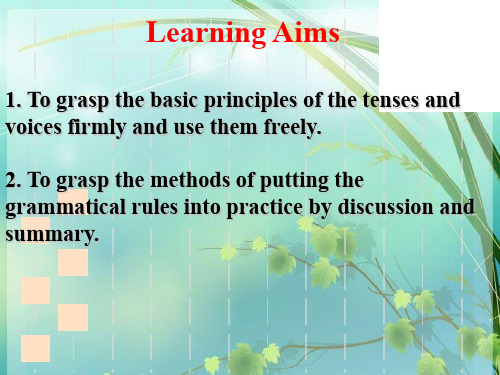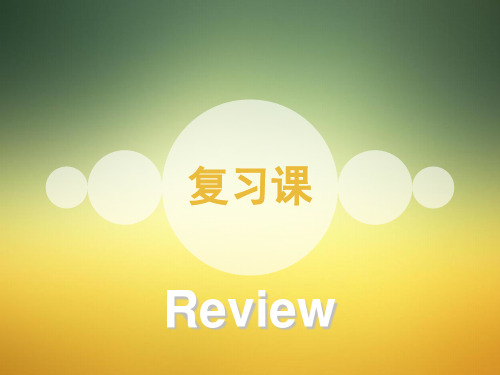英语 复习课课件
合集下载
期末总复习课件(共47张PPT) 人教版英语八年级上册.ppt

例如:He likes apples.他喜欢苹果。 ( 主语是He, likes 是动词第三人称单数形式)
一般现在时的关键词:always,(总是),often(经常), usually (通常), never从未;every day每天, every week每周, every year每年, sometimes有时候, at times时常。
A.as better as B.as good as √C.as well as
( )8.The programs on Channel 10 are ____better than Channel 5.
A.more
√B.much
C.many
( )9.He is _____than any other students in his class.
A.cold B√.colder
C.coldest
( )14.Which city is______,Bei jing,Shang hai or Liuzhou?A.bigB.bigger
√C.the biggest
模块5和6:动词不定式 (1)、(2)和双宾语。 1.动词不定式(带to的动词):to+动词原形(注:to do代表不定式) 例如:She wants to see her aunt.她想去看望她的阿姨。
( )4.I______ my homework when my mother came home.
A.am doing √B.was doing C.did ( )5.She often ______ shopping with her mother.
A√.goes B.go C.went ( )6.We_____swimming tomorrow afternoon.
一般现在时的关键词:always,(总是),often(经常), usually (通常), never从未;every day每天, every week每周, every year每年, sometimes有时候, at times时常。
A.as better as B.as good as √C.as well as
( )8.The programs on Channel 10 are ____better than Channel 5.
A.more
√B.much
C.many
( )9.He is _____than any other students in his class.
A.cold B√.colder
C.coldest
( )14.Which city is______,Bei jing,Shang hai or Liuzhou?A.bigB.bigger
√C.the biggest
模块5和6:动词不定式 (1)、(2)和双宾语。 1.动词不定式(带to的动词):to+动词原形(注:to do代表不定式) 例如:She wants to see her aunt.她想去看望她的阿姨。
( )4.I______ my homework when my mother came home.
A.am doing √B.was doing C.did ( )5.She often ______ shopping with her mother.
A√.goes B.go C.went ( )6.We_____swimming tomorrow afternoon.
高一上学期英语人教版( )必修第一册Welcome unit复习课课件(14张ppt)

6.在高中有很多东西可以探索。
There’s a lot to explore at senior high.
explore vt.& vi.探索;勘探
exploration n. 探索 explorer n.探险者
6. ...and there is a lot to explore at senior high. ★表示将来的动作,如: My wish to visit France has come true at last.我想参观法国的愿望终 于实现了。 ★与被修饰词之间有动宾关系,如是不及物动词,则需加介词,如:
Do you have anything to be taken to your sister? 主语you与take之间不能构成主谓关系
7.我的学长说如果我集中精力学习英语,就会掌握这门语言的。
My senior tells me that if I can concentrate on learning English, I will have a good command of the language.
= She would never solve this problem without her classmates’ help.
You will never succeed without teamwork.
12. 她发现这篇课文很难理解。
She found the text difficult to understand.
Welcome Unit
复习课
英汉互译 1. 这个年轻的学生向学长咨询英语学习。 2. 虽然他年长于他的妻子, 但他妻子的收入比他高。 3. 我想给人留下好的第一印象。 4.如果你想升职,给你的上级留下好印象很重要。 5.如果这件事发生在你身上,你会怎么做? 6.在高中有很多东西可以探索。 7.我的学长说如果我集中精力学习英语,就会掌握这门语言的。 8. 千里之行始于足下。 9.自信会使你在新学校更快地交到朋友。 10.这项活动的目的是帮助下岗很长时间的人。
情态动词(17张PPT)初中英语专项复习课件

情态动词表推测也是每年中考的重点,以考查can’t 和must为主,主要在单项选择中考查不同情态动词的辨 析。考生在解答此类试题时,可以从以下几方面着手: ①表示否定的推测:一是断然的否定,此类题一般是考 查情态动词表推测的用法,语境会对所填空给出解释, 据 此 可 以 判 断 是 非 常 肯 定 的 否 定 , 此 时 最 好 用 cannot /can’t;二是表示不能十分肯定或拿不准,此类题一般 也会有相关的语境提示,如I’m not sure、who knows等 ,此时最好用may或might。
表示需要、必须,主 要用于否定句和疑问 句中。needn’t常用 于回答must表请求的 否定回答
—Must I finish my homework now?我必 须现在完成我的家庭作 业吗? —No, you needn’t. 不, 你不需要。
注意 (1) must和have/has to均意为“必须”,常可互 换使用。但have/has to是用于强调客观需要,意为 “必须, 不得不”;must用于表示主观看法, 意为“ 必须, 应该”。如:We’ll have to ask Zhang Hong. 我们必须去问张红了。 We must work hard at school. 在学校我们必须 努力学习。
情态动词本身有一定的意义,但不能独立作谓语, 没有人称和数的变化,后面必须接动词原形。常见的情 态动词有:may, must, need, have to 等,具体用法见下表 :
情态动词
用法
例句
表示能力,意为 Sam can speak English well.
can “能,会”
山姆英语讲得很好。
He could have gone home. 他可能已回家了。
表示需要、必须,主 要用于否定句和疑问 句中。needn’t常用 于回答must表请求的 否定回答
—Must I finish my homework now?我必 须现在完成我的家庭作 业吗? —No, you needn’t. 不, 你不需要。
注意 (1) must和have/has to均意为“必须”,常可互 换使用。但have/has to是用于强调客观需要,意为 “必须, 不得不”;must用于表示主观看法, 意为“ 必须, 应该”。如:We’ll have to ask Zhang Hong. 我们必须去问张红了。 We must work hard at school. 在学校我们必须 努力学习。
情态动词本身有一定的意义,但不能独立作谓语, 没有人称和数的变化,后面必须接动词原形。常见的情 态动词有:may, must, need, have to 等,具体用法见下表 :
情态动词
用法
例句
表示能力,意为 Sam can speak English well.
can “能,会”
山姆英语讲得很好。
He could have gone home. 他可能已回家了。
Unit1复习课课件人教版英语八年级上册

03 重点语法归纳
一、few / a few little / a little
否定
肯定
few没有,几乎没有 a few有几个
所修饰的名词 可数名词复数
little几乎没有 a little有一点儿 不可数名词
二、seem的用法
seem 不及物动词 “似乎,好像” (1) seem like “好像” e.g.It seemed like a good idea. (2) seem +adj.e.g.He seemed unhappy. (3) seem to do sth.“似乎,好像做某事”
3.The doctors t_r_i_e_d___ their best, but still couldn't save the boy. 4.You can enjoy many a__c_t_i_v_it_i_e_s__ such as swimming and tennis in the club.
Ⅱ.单项选择。
1.I've been so bored for a long time.I hope to
C
have__________ to do.
A.exciting anything
ห้องสมุดไป่ตู้
B.nothing exciting
C.something interesting
D.good something
提示: 名词—— 体现可数或不可数的词 动词—— 时态,固定搭配 形容词副词——确定词性,选级
1.All the _b_u_i_ld_i_n_g_s(build) on Long Street are very tall. 2.Luna was h_h_u_n_g_r_y__, so she went to a restaurant to eat some food. 3.It's raining outside, Please take an u_u_m__b_r_e_ll_awith you when you go out. 4.17.The American girl __t_r_i_ed___ (try) her best to study Chinese, but she still got a C in the test. 5.At first Nick wanted to visit his uncle, but he __st_a_y_e_d__ (stay) at home at last. 6. There are many ___d_if_f_er_e_n_c_e_s__(different)between winter and summer weather.
初中英语语法复习课件:系动词 (共35张PPT)

系动词与一般动词辨析
比较动词用法 • The dishes taste delicious. • I tasted the dishes carefully
• Milk goes bad easily in summer if you don’t put it in the fridge. • Mary went quickly to school
3.She ____ engineer last year. A. became B. is becoming C. is D. turned
单选
1. Happy birthday, Alice! So you have ____ twenty-one already!
A. become
B. turned
the bad news.
A.sadly; sadly
B.sad; sad
C.sadly; sad
D. sad; sadly
6. I love to go to the forest in summer. It ____ good to walk in the forest or sit in the shade of trees.
系动词
动词:实意动词write buy 助动词He have seen the film I am learning English 情态动词must,could 系动词
体会区别 I like you 实意动词 主+谓+宾 I am a student系动词 主+系+表 He looks handsome 主+系+表 You seem ill主+系+表
2.The material _______very soft.
小学英语语法复习完整ppt课件

.
2
小学英语语法
可数名词单数变复数的变化规则:
情况
变化
例词
1 一般情况下 词后加s
book—books, bag—bags apple—apples, pen—pens
2 以s,sh,ch, 词后加es x结尾的词
bus—buses, brush--brushes watch—watches, box—boxes
2 以e结尾的词
词后加r
nice—nicer, cute--cuter
3 以辅音字母加y结 变y为i再加er funny—funnier
尾的
ugly—uglier
4 重读闭音节词(一 双写结尾的辅 hot—hotter
元一辅结尾且此音 音字母,再加 fat—fatter
节重读时)
er
thin—thinner big—bigger
man---men; woman---women; fish---fish; sheep---sheep;
child---children; foot---feet;
tooth---teeth; person---people;
mouse---mice; Chinese---Chinese,
Japanese----Japanese
2、分类:形容词性物主代词和名词性物主代词
3、用法:
①用于指代物品所属的词
②形容词性物主代词后需加名词,不可单独使用
③名词性物主代词后不加名词,可单独使用
.
7
小学英语语法
代词篇
人
称 主格
代 词
宾格
我 我们 你 你们 他 她 它
I we you you he she it me us you you him her it
英语四大时态复习课件ppt

• I lost much money last night.( C )
经营者提供商品或者服务有欺诈行为 的,应 当按照 消费者 的要求 增加赔 偿其受 到的损 失,增 加赔偿 的金额 为消费 者购买 商品的 价款或 接受服 务的费 用
改一般疑问句的方法:
①首先看有无be或情态动词,如果有,将be提到 句首并大写,句末打问号.
3对比
时态 现在进行 时
一般现在 时
一般过去 时
一般将来 时
表格对比学习
肯定句
否定句
一般疑问句
be+v-ing 在be 后加上not Be提到句首
(现在分词)
V -原形 V-s/es三单
在实义v.前用助动词 Do,Does 提
don’t ,doesn’t,行 到句首,实
为动词要还原
义动词还原
V-ed
化
Do you usually take the bus to work?
操
I don’t usually take the bus to work. 4.They are having classes.
练
Are they having classes?
They aren’t having classes.
判断时态形式:
A.现在进行时 B.一般现在时 C.一般过去时 D一般将来时
• He always likes playing the piano.( B )
• We are having an English classes now.( A)
• They often go home late.( B ) • Lucy is going to dance tomorrow.( D )
被动语态(21张PPT)初中英语专项复习课件

(4)特殊疑问句式 ①特殊疑问词(不作主语)+情态动词+主语+be原形+过 去分词 When can my computer be repaired? 我的电脑什么时候能修好? ②特殊疑问词(作主语)+情态动词+be原形+过去分词 What must be done next? 下一步该做什么?
1.—Why does the earth look blue in space?
考点四 :一般将来时的被动语态 (will+be+done;am/is/are going to+be+done)
A new school library will be built next year. 一个学校的新图书馆将明年建成。(肯定句) →A new school library won’t be built next year. (否定句,在will后加not) →Will a new school library be built next year? (一般疑问句,把will提句首)
A new school library is going to be built next year. 一个学校的新图书馆将明年建成。(肯定句) →A new school library isn’t going to be built next year. (否定句,在is/am/are后加not) →Is a new school library going to be built next year? (一般疑问句,把is/am/are提句首)
3.More chances _____B_ for students to learn from each
英语复习课件(人教):简单句陈述句、疑问句、反意疑问句、感叹句、祈使句、倒装句(共20张PPT)

考点三 反意疑问句
反意疑问句的构成: 陈述句+附加疑问句?附加疑问句的 否定式必须缩写。
1.陈述句部分与附加疑问句部分意思相反: 前肯后否、 前否后肯。
Mary is a teacher, ___is_n_'_t_s_h_e_? He didn't tell you the story, ___d_id__h_e___? 2.反意疑问句的基本对应形式如下: (1)be动词对应be动词。如: She is a policewoman, __i_sn__'t_s_h_e__? (2)情态动词对应情态动词。如: He can drive the car, __c_a_n_'_t _h_e__?
语法互动(十二)┃简单句(陈述句、疑问句、 反意疑问句、感叹句、祈使句、倒装句)
考点、疑问句、 反意疑问句、感叹句、祈使句、倒装句)
W__h__a_t ___ a beautiful flower it is! 这是一朵多么漂亮的花啊! _W__h__at___ good news it is! 多好的消息啊! _H__o_w____ fast Jim runs! 吉姆跑得多么快啊!
语法互动(十二)┃简单句(陈述句、疑问句、 反意疑问句、感叹句、祈使句、倒装句)
考点一 陈述句 陈述句是用于陈述一个事实或表达说话人的看法的句子。
陈述句主要分为肯定句和否定句。 1.陈述句的肯定句式主要有五种基本句型 (1)“主语+系动词+表语” I am honored. 我很荣幸。 (2)“主语+不及物动词” The students work very hard. 学生们学习很努力。 (3)“主语+及物动词+宾语” I teach English. 我教英语。
语法互动(十二) 简单句(陈述句、 疑问句、反意疑问句、感叹句、
反意疑问句的构成: 陈述句+附加疑问句?附加疑问句的 否定式必须缩写。
1.陈述句部分与附加疑问句部分意思相反: 前肯后否、 前否后肯。
Mary is a teacher, ___is_n_'_t_s_h_e_? He didn't tell you the story, ___d_id__h_e___? 2.反意疑问句的基本对应形式如下: (1)be动词对应be动词。如: She is a policewoman, __i_sn__'t_s_h_e__? (2)情态动词对应情态动词。如: He can drive the car, __c_a_n_'_t _h_e__?
语法互动(十二)┃简单句(陈述句、疑问句、 反意疑问句、感叹句、祈使句、倒装句)
考点、疑问句、 反意疑问句、感叹句、祈使句、倒装句)
W__h__a_t ___ a beautiful flower it is! 这是一朵多么漂亮的花啊! _W__h__at___ good news it is! 多好的消息啊! _H__o_w____ fast Jim runs! 吉姆跑得多么快啊!
语法互动(十二)┃简单句(陈述句、疑问句、 反意疑问句、感叹句、祈使句、倒装句)
考点一 陈述句 陈述句是用于陈述一个事实或表达说话人的看法的句子。
陈述句主要分为肯定句和否定句。 1.陈述句的肯定句式主要有五种基本句型 (1)“主语+系动词+表语” I am honored. 我很荣幸。 (2)“主语+不及物动词” The students work very hard. 学生们学习很努力。 (3)“主语+及物动词+宾语” I teach English. 我教英语。
语法互动(十二) 简单句(陈述句、 疑问句、反意疑问句、感叹句、
高考英语时态复习 PPT课件 图文

--- I had just finished my work and____ to take a shower.
A. had started B. started C. have started D. was starting
过去进行时表示过去将来.
1. 一般过去时和过去进行时 1. He ______ a book about China last year, but I
had meant/planned/intended to do…,表示过 去未曾实现的愿望、打算、想法等。
热点4:过去进行时
1. The last time I saw Jane she _w_a_s_p_i_c_k_in_g_ cotton in the fields. (pick)
2. ---Has Sam finished his homework today?
2. As she ___ the newspaper, Granny ___ asleep.
A. read; was falling
B. was reading; fell
C. was reading; was falling D. read; fell
结论:长动作在进行时,被一个短动作打断,长动 作用进行体,短动作用一般体.
造成影响和结果.
1.---The window is dirty. ---I know. It _ห้องสมุดไป่ตู้__ for weeks.
A. hasn’t cleaned B. didn’t clear C. wasn’t cleaned D. hasn’t been cleaned
2. --- Would you like to go to the cinema with me tomorrow afternoon?
A. had started B. started C. have started D. was starting
过去进行时表示过去将来.
1. 一般过去时和过去进行时 1. He ______ a book about China last year, but I
had meant/planned/intended to do…,表示过 去未曾实现的愿望、打算、想法等。
热点4:过去进行时
1. The last time I saw Jane she _w_a_s_p_i_c_k_in_g_ cotton in the fields. (pick)
2. ---Has Sam finished his homework today?
2. As she ___ the newspaper, Granny ___ asleep.
A. read; was falling
B. was reading; fell
C. was reading; was falling D. read; fell
结论:长动作在进行时,被一个短动作打断,长动 作用进行体,短动作用一般体.
造成影响和结果.
1.---The window is dirty. ---I know. It _ห้องสมุดไป่ตู้__ for weeks.
A. hasn’t cleaned B. didn’t clear C. wasn’t cleaned D. hasn’t been cleaned
2. --- Would you like to go to the cinema with me tomorrow afternoon?
人教版八年级英语上册Unit2复习课件(共24张PPT)

对频度副词或状语提问一段时间内发生了几次活动提问某动作或者状态发生的频率你还记得本单元的语法点吗频度副词频度副词neverseldomsometimesfrequentlyoftenusuallyalways频度副词定义常见词实义动词之前动词be助动词情态动词等之后sometimes也常置于句首表示动作发生次数的副词位置你还记得本单元的语法点吗
29.多于 ____m_o_r_e_t_h_a_n_/_o_v_e_r__
30.少于 ___le_s_s_t_h_a_n_________
同学们,本单元的重点句子你们都掌握了吗? 1.例如进行体育活动之类的锻炼是很有趣的__E__x_e_rc__is_e__s_u_c_h__a_s__p_l_a_y_in__g_s__p_o_r_ts__is fun. 2.旧习难改。_O__ld__h_a_b_i_ts__d_i_e__h_ard. 3.这些就是结果。_H_e__re__a_r_e__th__e_r_e_s_u__lts. 4.它对身心而言是健康的。I_t’___s_h_e__a_lt_h_y__fo__r _th__e_m__i_n_d__a_n_d__t_h_e_body.
14.去看牙医 ____g_o__to__th_e__d_e_ntist
15.和某人一起度过时光__s_p_e_n_d_time with sb.16.业余活动 __fr_e_e_t_im__e_a_c_t_iv_it_ies
17.在某人的业余时间 __in__o_n_e_’_s free time 18.有空 _______b_e_f_re_e________
同学们,本单元的短语你们都掌握了吗?
1.看电视_______w_a_tc_h__T_V______ 3.锻炼__d_o_e_x_e_r_c_is_e_/_ta_k_e__e_xe_r_c_is_e 5.阅读英语书 _r_e_a_d_E_n_g_l_is_h__b_o_o_ks 7.去看电影 _g_o__to__th_e__m_o_v_i_e_s___ 9.去购物 ___g_o__s_h_o_p_p_in_g_______ 11.帮助做家务 _h_e_lp__w_i_th__h_o_u_s_e_work
29.多于 ____m_o_r_e_t_h_a_n_/_o_v_e_r__
30.少于 ___le_s_s_t_h_a_n_________
同学们,本单元的重点句子你们都掌握了吗? 1.例如进行体育活动之类的锻炼是很有趣的__E__x_e_rc__is_e__s_u_c_h__a_s__p_l_a_y_in__g_s__p_o_r_ts__is fun. 2.旧习难改。_O__ld__h_a_b_i_ts__d_i_e__h_ard. 3.这些就是结果。_H_e__re__a_r_e__th__e_r_e_s_u__lts. 4.它对身心而言是健康的。I_t’___s_h_e__a_lt_h_y__fo__r _th__e_m__i_n_d__a_n_d__t_h_e_body.
14.去看牙医 ____g_o__to__th_e__d_e_ntist
15.和某人一起度过时光__s_p_e_n_d_time with sb.16.业余活动 __fr_e_e_t_im__e_a_c_t_iv_it_ies
17.在某人的业余时间 __in__o_n_e_’_s free time 18.有空 _______b_e_f_re_e________
同学们,本单元的短语你们都掌握了吗?
1.看电视_______w_a_tc_h__T_V______ 3.锻炼__d_o_e_x_e_r_c_is_e_/_ta_k_e__e_xe_r_c_is_e 5.阅读英语书 _r_e_a_d_E_n_g_l_is_h__b_o_o_ks 7.去看电影 _g_o__to__th_e__m_o_v_i_e_s___ 9.去购物 ___g_o__s_h_o_p_p_in_g_______ 11.帮助做家务 _h_e_lp__w_i_th__h_o_u_s_e_work
小学英语总复习 ppt课件

替。如: This (suit) is expensive, isn't it? 这套衣服昂贵,不是吗? "Are those yours?" "Yes, they are." “那些是你的吗?”“是的,
它们是我的。
常见的疑问代词有who(谁)when(什么时候),where (哪里),what(什么),how(怎样) ,which(哪一个) 等等。
名词
写出下列各词的复数 I ___w_e ___ him ___th_e_y __ this __t_ha_t ___ her __t_he_y__ watch _w_a_tc_h_e_s _child _c_h_ild_re_n_that ___th_os_e__ phos___ sandwich_s_a_nd_w_ic_he_s_ boy___bo_y_s __dress__d_re_ss_e_s _tooth___te_et_h__sheep_s_h_e_ep__ box__b_ox_e_s__man__m_en___woman__w_om_e_n__ toy__to_ys____ family__fa_m_il_ie_s _
一、人称代词和物主代词
1、人称代词有主格和宾格的区别:主格通常位于句中第 一个动词之前,宾格一般位于动词或介词之后。
2、物主代词有形容词性与名词性的区别:形容词性用时 后面一般要带上词,名词性则单独使用,后面不带名词。
3、指示代词 共有四个:this,that,these,those。this 和 that 用于指代单数,these和 those用于指代复数。
4、疑问代词 一般用来构成特殊疑问句,常见的疑问代词 有who(谁),when什么时候),where(哪里),what(什 么),how(怎样) ,which(哪一个)等等。
它们是我的。
常见的疑问代词有who(谁)when(什么时候),where (哪里),what(什么),how(怎样) ,which(哪一个) 等等。
名词
写出下列各词的复数 I ___w_e ___ him ___th_e_y __ this __t_ha_t ___ her __t_he_y__ watch _w_a_tc_h_e_s _child _c_h_ild_re_n_that ___th_os_e__ phos___ sandwich_s_a_nd_w_ic_he_s_ boy___bo_y_s __dress__d_re_ss_e_s _tooth___te_et_h__sheep_s_h_e_ep__ box__b_ox_e_s__man__m_en___woman__w_om_e_n__ toy__to_ys____ family__fa_m_il_ie_s _
一、人称代词和物主代词
1、人称代词有主格和宾格的区别:主格通常位于句中第 一个动词之前,宾格一般位于动词或介词之后。
2、物主代词有形容词性与名词性的区别:形容词性用时 后面一般要带上词,名词性则单独使用,后面不带名词。
3、指示代词 共有四个:this,that,these,those。this 和 that 用于指代单数,these和 those用于指代复数。
4、疑问代词 一般用来构成特殊疑问句,常见的疑问代词 有who(谁),when什么时候),where(哪里),what(什 么),how(怎样) ,which(哪一个)等等。
英语复习课件八年纪

cultivation • Improving writing skills
01 Course Introduction and Objectives
CHAPTER
The purpose and importance of this course
To provide a comprehensive and systematic review of English language skills for right year olds
Help children understand the plots and characters of these stories
through listening, and guide them to approximate the beauty of language and literature
Teaching objectives and requirements
To enhance reading comprehension skills and resource independent reading
To develop writing skills, including the ability to compose simple essays and stories
English review courseware for eight years old
目录
CONTENTS
• Course Introduction and Objectives • Vocabulary and Grammar Review • Reading comprehension training • Listening training and improvement • Oral expression and communication ability
01 Course Introduction and Objectives
CHAPTER
The purpose and importance of this course
To provide a comprehensive and systematic review of English language skills for right year olds
Help children understand the plots and characters of these stories
through listening, and guide them to approximate the beauty of language and literature
Teaching objectives and requirements
To enhance reading comprehension skills and resource independent reading
To develop writing skills, including the ability to compose simple essays and stories
English review courseware for eight years old
目录
CONTENTS
• Course Introduction and Objectives • Vocabulary and Grammar Review • Reading comprehension training • Listening training and improvement • Oral expression and communication ability
